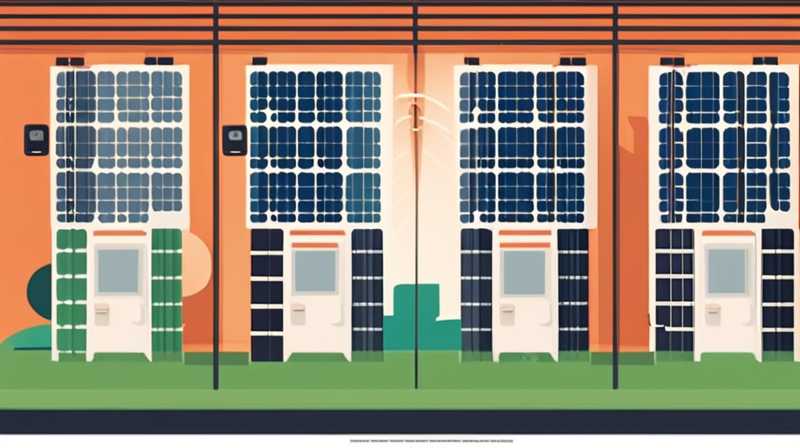
To restart solar panels, the process involves a combination of checking connections, ensuring proper functionality, and possibly resetting the system. 1. Check the inverter status, 2. Inspect circuit breakers, 3. Ensure safety measures, 4. Restart the inverter. The inverter plays a critical role as it converts the direct current generated by solar panels into usable alternating current for household consumption. If the inverter indicates an error or malfunction, it needs to be addressed before the system can resume operation. Regular maintenance and troubleshooting practices are vital to keep the solar panel system functioning efficiently.
1. UNDERSTANDING SOLAR PANEL SYSTEMS
Solar panels operate by harnessing sunlight and converting it into electricity, leveraging photovoltaic cells to accomplish this task. Solar power systems can consist of several components, including solar panels, an inverter, batteries for storage, and a monitoring system. Each element plays a pivotal role in the overall functionality, and understanding each component is crucial for troubleshooting when problems arise.
The inverter is particularly significant, as it transforms the electricity from solar panels into a form that can be used by electrical appliances in homes. If issues arise with the inverter, the entire system can become inoperative. Therefore, inspecting the inverter status regularly and addressing any errors immediately is essential for ensuring optimal performance.
2. DIAGNOSING ISSUES WITH SOLAR PANELS
When solar panels do not appear to be functioning properly, a systematic approach to diagnosing the issue is necessary. Common problems can stem from various sources, including connections, shading, or even physical damage to the panels. By methodically troubleshooting these elements, one can often identify the root cause of the problem and address it effectively.
Factors such as debris, dirt, or leaves can hinder the solar panels’ ability to absorb sunlight, necessitating regular cleaning. More severe issues might require a professional assessment, particularly if there are signs of physical damage or electrical faults within the system. Regular monitoring of the system’s performance aids in identifying discrepancies before they escalate into larger problems.
3. STEPS TO RESTART SOLAR PANELS
If the solar panel system requires a restart, specific steps should be followed to ensure safety and effectiveness. 1. Begin by checking the inverter status, which often provides diagnostic information. 2. Verify whether any circuit breakers or fuses have tripped. These inspections should be conducted carefully, as interacting with electrical components can pose safety risks.
After confirming that there are no immediate issues with the inverter and circuit breakers, proceed to turn off the inverter completely. This step is crucial as it ensures that any potential electrical faults are not transmitted across the system. Following this, circuit breakers can be reset, and the inverter can be powered back on, allowing the system to restart and recalibrate itself successfully.
4. MAINTAINING SOLAR PANELS FOR OPTIMAL PERFORMANCE
Preventive care and attentive maintenance of solar panels play an integral role in their longevity and efficiency. Regular inspections should cover several key areas, including wiring, inverter operations, and panel cleanliness. Depending on location, more frequent cleaning may be required, as accumulated dust and grime can significantly impede performance.
In addition to physical maintenance, monitoring energy output through a digital app or interface can help users assess system performance over time. It allows homeowners to detect inconsistencies as soon as they arise, paving the way for timely interventions. Having a professional check the system at least once a year is also advisable, as experts can identify issues that may not be visible to the untrained eye.
FREQUENTLY ASKED QUESTIONS
WHAT CAUSES SOLAR PANELS TO MALFUNCTION?
Solar panels can malfunction for several reasons, including physical damage, shading from nearby objects, dirt accumulation, or issues with the inverter. Maintaining clear pathways for sunlight is vital. Regularly cleaning the panels and inspecting surrounding foliage can prevent shading problems. The inverter status should also be monitored, as it often serves as the first indicator of potential issues. Ensuring all connections are secure and free from corrosion can help maintain optimal performance. If physical damage occurs, such as cracks in glass or impacting debris, immediate attention should be sought to prevent further problems.
HOW OFTEN SHOULD SOLAR PANELS BE CHECKED FOR MAINTENANCE?
The frequency of checks largely depends on environmental factors and specific system configurations, but a general guideline suggests at least bi-annual inspections. Regular assessments can reveal emerging issues preemptively. Homeowners in dusty areas or regions with high storm activity may require more frequent maintenance to ensure panels remain clear and undamaged. In addition to this, seasonal checks can align with changes in weather patterns, ensuring the system operates smoothly through different conditions. A thorough check-up performed by a professional at least once a year can provide insights that might be overlooked during regular visual inspections.
CAN I RESTART MY SOLAR PANELS MYSELF?
Yes, most homeowners can restart their solar panels by following accessible procedures, provided they remain cautious and familiar with their system. It is crucial to ensure safety precautions are followed during the process. Before conducting any inspections, turning off the inverter and circuit breakers is a good practice to mitigate risks. Users should also refer to the manufacturer’s guidelines specific to their solar panel model for detailed instructions. However, if there are significant issues identified such as persistent error messages or physical damage, consulting a professional is highly recommended for safe resolution.
In summary, understanding the complexities of solar panel systems allows homeowners to perform essential maintenance and troubleshoot effectively. By regularly checking the inverter status, inspecting physical components, and ensuring cleanliness, solar panels can maintain optimal performance throughout their lifespan. Frequent inspections and professional evaluations will further improve reliability and efficiency, maximizing the advantages that solar energy provides. The ability to restart the system independently and methodically troubleshoot issues can empower homeowners, fostering a sustainable and self-sufficient energy solution.
Original article by NenPower, If reposted, please credit the source: https://nenpower.com/blog/how-to-restart-solar-panels/


